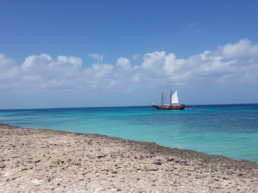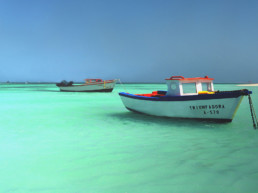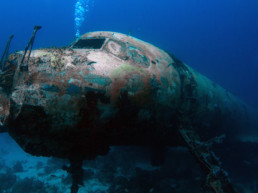My first trip to Aruba was this past summer, though I assure you, it won’t be my last. The small arid Caribbean island off the coast of Venezuela is home to just over 104,000 people and is under 180 square kilometers. You can circumnavigate it in less than eight hours. While this makes it pint-sized relative to the likes of Jamaica, Cuba and even St. Lucia, Aruba still offers a wide variety of travel experiences. From luxe beachside all-inclusive resorts, to casual apartments tucked into the hillside, kite surfing to scuba diving, wood fired pizza to incredible fresh fish, Aruba travel should be on your radar.
The Caribbean has been in the spotlight lately for the incredibly destructive hurricane season that impacted much of the region. Aruba was seemingly untouched by mother nature’s cruel hand. Not only is Aruba a great destination on its own, but for the time being it’s one of a handful of viable islands where travel is currently feasible. So here’s my take on why I plan to return to Aruba. Perhaps I’ll see you there.
1. Aruba’s Year-Round Sunshine
Yes there is a ‘dry’ and slightly ‘wet’ season in Aruba. However unlike Costa Rica, or even Mexico, we’re not talking about unrelenting monsoon rain for months on end. Peak travel period spans from mid-December to late April, during which you can expect virtually no rain and pleasant temperatures around 26 to 30 degrees Celsius or 80 to 86 Fahrenheit. Though, expect hotel prices to peak at this time. From May through September travellers can expect significantly lower prices and slightly warmer weather, think 32 to 36 degrees Celsius. October through December is the supposed rainy season, but monthly rainfall during this time is still less than 100 millimeters, or four inches of rain. Precipitation tends to be brief and a mix of sun and clouds prevail. Strong trade winds are near constant on the island year round, so while it’s no doubt hot at times, you don’t feel the oppressive humidity that you would elsewhere.
During my week long stay in May, a 30-70% chance of rain or thunderstorms was in the forecast for five of the seven days. Ultimately it only rained for five minutes on one single day. We actually didn’t even see the rain itself, only the wet sidewalk afterwards. Aruba gets my stamp of approval for year round sunshine.
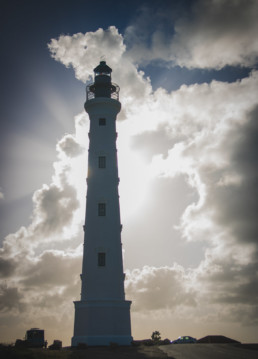
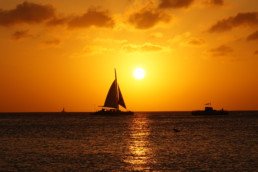
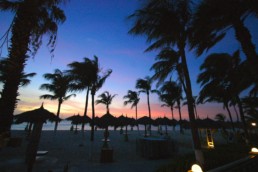
2. Hurricane Proof
The hurricane season of 2017 will go down in infamy for the fierce storms unleashed across the Caribbean. It will take years for the likes of Barbuda, St. Martin, and Puerto Rico to fully recover. There were very few islands in the region that escaped unscathed. Aruba lies outside of the hurricane belt and is rarely affected. The greatest impact that storms tend to have is on the water clarity around the island (normally pristine), following large storms elsewhere. Keep this in mind while booking any scuba diving, but otherwise you’re good to go!
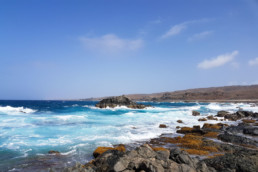
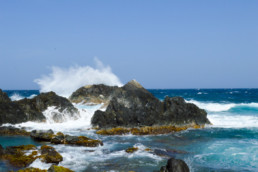
3. Peace of Mind in Aruba
As a solo female traveler, one of the first questions I’m often asked is about the safety of the destinations I visit. Aruba is very much a friendly island with all the amenities one finds in developed regions. Expect well paved roads, a plethora of reputable rental car companies, ATMs, gas stations, grocery stores, etc. What’s more, almost all restaurants happily accept credit cards. Whether at a bar, restaurant or on a local boat tour, the vibe is the complete antithesis of ‘sketchy’ or ‘seedy’. Everyone speaks English, or often Dutch given the island’s colonial history. This in turn makes asking for directions or help along the way easy for most North American travelers. As someone who doesn’t always enjoy driving alone in foreign countries, cruising the coastal highways of Aruba is a literal breeze.
4. Accommodation Options for All Aruba Travelers
Aruba also wins for the range of accommodation choices and experiences it offers travellers. Don’t get me wrong, it is comparatively expensive. Unlike Cuba or the Dominican Republic, you’re certainly not going to get all inclusive holiday deals for under $1,000 with flight. However, flights are reasonable (deals can be had for under $400 round trip inclusive of all fees), and accommodation choices on the island can be tailored to suit many budgets. The Ritz Carlton, Marriott or Riu may cost you $400 to $700 USD per night during peak season. Boutique properties like The Boardwalk Small Hotel range from $138 to $450 USD per night. Apartment style accommodation that fits a family of four can be found for under $100 USD per night if you’re willing to stay off the beach. My top pick for this style of Aruba travel would be Pauline’s Apartments.
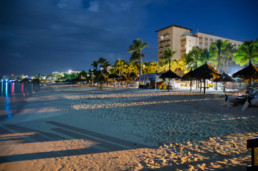

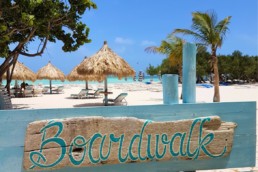
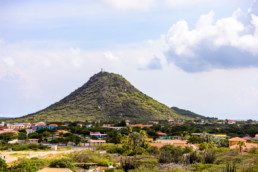
5. Easy Flights (for some)
If you’re looking to maximize your vacation with limited time in transit, Aruba travel is again worthy of close consideration. This is particularly true for select Canadians. Direct flights to Aruba’s Queen Beatrix International Airport from Toronto are only 4.5 hours. That will get you to the island’s idyllic white beaches in less time that it takes to fly to Vancouver. Unfortunately, direct flights are not available from any other major Canadian city. American travellers departing from major hubs such as Miami, New York, Atlanta and Boston are also able to fly direct. However, I recognize that this means the vast majority of US residents have to contend with longer multi flight travel days.
Aruba follows Atlantic Time Zone (UTC/GMT -4). Travel to the island won’t mess with the internal clocks of most visitors coming from central or eastern areas of North America. If you’re looking to avoid jet lag Aruba might just be your answer.
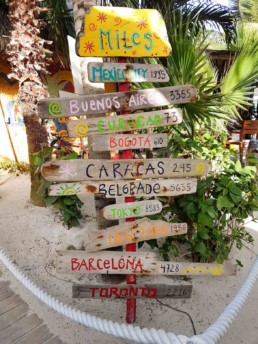
6. Aruba’s Wide Ranging Activities
I’ve written extensively about the range of activities and beaches that will keep travellers busy on the island. Check out Exploring Wrecks With JADS Scuba Center for more on scuba diving. Water fanatics can also check out The Coolest Underwater Experience with Seabob Aruba. While those interested in a range of land based pursuits including ATVing, hiking, and cycling can learn more by reading Adventure with Boardwalk Small Hotel. The wide selection of boat tours on the island range from rowdy booze cruise style sailings of the Jolly Pirates, to more exclusive and relaxing sunset cruises aboard The Blue Melody and Black Pearl. All budgets are covered.
All in all, Aruba has the potential to cross nearly every wish off the list for travellers, whether you’re a honeymooner looking for romance, a snowbird in search of sun, or a bachelor party interested in cocktails and ATVs (not at the same time, of course). Best of all, thanks again to the relatively small size of the island, travellers are able to get to and from different activities or towns with relative ease. You’re not sitting in a vehicle for hours on end to get to your destination – unless of course you’re renting a Jeep and choosing to cruise the island for the day for pleasure.
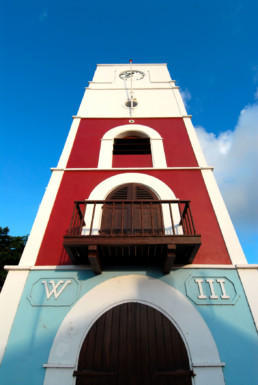
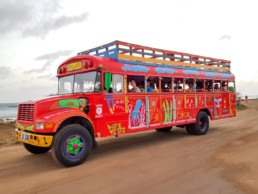
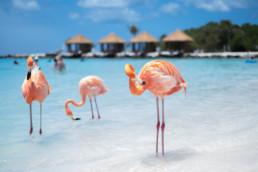
7. Standard of Living in Aruba
The socioeconomic factors at play in each travel destination will always vary. For some travellers, being exposed to considerable poverty and economic disparity is enough to deter a visit entirely. While this shouldn’t be a primary factor in deciding where and where not to visit, for many travellers its at least a consideration. After a combination of personal and volunteer travel to several Caribbean countries, I’ve been exposed me to a wide range of standards of living and Aruba, which is technically still a Dutch colony, has by far the highest standard of living among them. As tangible points of reference, both locals and visitors alike can access the official and efficient public transit system and clean tap water island wide.
8. Sunsets & Sunrises- No Need to Choose
Once again, Aruba’s small size delivers yet another benefit. Travelers are able to enjoy sunrise and sunset along the island’s many beaches, all of which are public by the way. By car, it’s entirely possible to cross the six mile width of the island in under 30 minutes. Hiking trails around Alto Vista Chapel are perfect to take in the rising sun over a rugged and windy coastline in total privacy. Conversely, sunsets are best enjoyed along popular Palm Beach or the iconic lighthouse at the northern tip of the island.
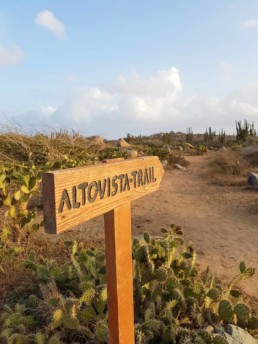
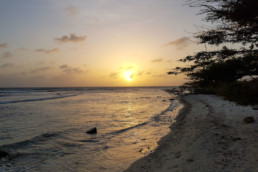

Aruba Travel photos by Madeline Burch and courtesy of the Aruba Travel and Tourism Authority.
Although a portion of Madeline’s accommodation and activities in Aruba were subsidized by local businesses, the opinions expressed in this article are not paid for and entirely her own.
Make your next trip the best one.
Departful is a full service travel agency creating truly exceptional travel experiences that are 100% personalized to you. Wherever you’re going, whatever your interests, we help you plan the perfect trip.
Madeline Burch
Madeline was born and raised in Toronto Canada, educated in marketing, and has worked in brand management and the alcohol industry for nearly a decade. In search of great drinks, stories and photos, she has travelled to South East Asia multiple times including a recent eight month stint based in Vietnam. From luxe travel to volunteer missions, she’s interested in it all.


